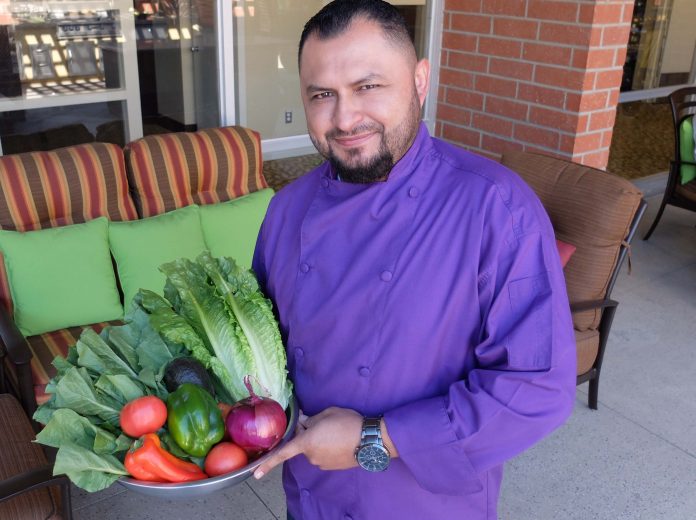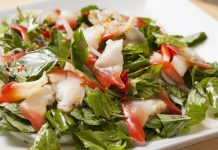Daniel Calderon started cooking with his grandmother, Maria Catalina, when he was just 6 years old. Even then, grandma told him he’d grow up to be a chef.
Turns out, grandma was right. Daniel, who emigrated to the U.S. from El Salvador by himself at 17, started cooking professionally 14 years ago. He worked his way up through the restaurant ranks at the Four Seasons Hotel in Fashion Island and at Katella Senior Community in Seal Beach before joining Rowntree Gardens, a not-for-profit, faith-based, continuing care retirement community in Stanton.
Daniel Calderon started cooking with his grandmother, Maria Catalina, when he was just 6 years old. Even then, grandma told him he’d grow up to be a chef.
Turns out, grandma was right. Daniel, who emigrated to the U.S. from El Salvador by himself at 17, started cooking professionally 14 years ago. He worked his way up through the restaurant ranks at the Four Seasons Hotel in Fashion Island and at Katella Senior Community in Seal Beach before joining Rowntree Gardens, a not-for-profit, faith-based, continuing care retirement community in Stanton.
Daniel became head chef at Rowntree Gardens in July 2014. The current Long Beach resident runs a 30-person staff and provides three nutritious, home-cooked meals a day for more than 300 community members and many staff.
Chef Daniel and Rowntree Gardens are on a mission to create healthy, hearty food specially designed to nurture seniors’ taste buds, minds, bodies and souls.
Based on Rowntree’s collective experiences cooking for older adults, consulting with experts and conducting research, Rowntree has developed these five essential senior dietary guidelines: Eat fresh, use healthy cooking methods, focus on nutrient-dense super foods, snack healthy and maintain balance – not denial.
Eat fresh (low sodium, lots of veggies)
Chef Daniel’s first focus at Rowntree Gardens is making as many dishes as possible from scratch using fresh, natural ingredients.
“Homemade is always better than processed,” Daniel said. “You almost always avoid unwanted preservatives, fats, sugars, chemicals and especially salt when you go with homemade. Too much sodium is bad, can lead to heart disease and is found in many processed foods.”
Chef Daniel makes all soups and salad dressings from scratch at Rowntree Gardens. He seasons these items and most things with minimal salt so that community members can control their own sodium intake.
Any diet should contain a lot of fresh fruits and vegetables. The following are some of the healthiest vegetables and fruits seniors should incorporate into their diets:
—Leafy greens,such as: spinach, collard, turnip, kale, beet and mustard;
—Green leaf and romaine lettuces (great sources of Vitamin A);
—Broccoli, peppers, tomatoes, cabbage (especially Chinese cabbage), brussels sprouts, and potatoes (vitamin C);
—Baked white or sweet potatoes (sweet potatoes are best), cooked greens (such as spinach) and winter (orange) squash (high potassium, which helps keep bones strong and can reduce blood pressure);
—As far as fruits to consume, great choices include: oranges (high vitamin C and folic acid), bananas, plantains, many dried fruits, cantaloupe and honeydew melons (more potassium).
Rowntree Gardens has replaced nearly all canned vegetables with fresh or frozen ones. Although frozen vegetables/fruits are technically processed, they’re typically frozen fresh with minimal if any other ingredients added. They retain their nutrient levels much better than their canned counterparts.
Use healthy cooking methods
Sometimes,it’s not necessarily what you cook, but how you cook it.
A few guidelines:
• —Use non-stick pans to cut down on oil and butter;
• —A home and when eating out, broil, steam or stir fry instead of pan fry or deep fry your food;
• —If eating out and you don’t see many obvious healthy options, don’t be afraid to ask; Restaurants are typically open to making changes, like broiling instead of frying your fish.
Focus on nutrient-dense super foods
Here are some of the most important nutrients seniors should include in their diets and tips on how to get them:
—Fiber helps the colon work better, helps to lower cholesterol and can reduce the risk of heart disease. Great sources include: wheat bran, whole grains, fruits, vegetables and legumes;
—Omega 3 fatty acids have been proven to reduce inflammation, which can cause heart disease, cancer and arthritis. These essential fats are found in many different types of fish and in flaxseed oil;
—Calcium is an essential vitamin for bone strength and health – especially for women and seniors at risk for osteoporosis. Calcium can also lower blood pressure. Besides milk, other sources of calcium include: cheese, yogurt, dark leafy greens, or calcium-fortified foods such as fortified orange juice and cereal.
The need for Vitamin D also increases as you age. Good sources of vitamin D include herring, sardines, salmon, tuna and eggs.
Seniors, like all of us, should also eat foods that boost brainpower and memory, such as blueberries, freshly brewed tea and dark chocolate.
Among the ways staff members follow their own advice at Rowntree Gardens,include regularly offering: vegetable lasagna on their standard menu along with veggie quesadillas and salmon Caesar salad on our alternative menu; providing made-to-order smoothies that include a mix of fresh fruits, such as: pineapple, strawberries, blueberries, black berries and bananas — and adding spinach, kale or carrots, if requested; offering a salad bar with most meals; steaming veggies; and much more.
Snack healthy
It’s perfectly fine and healthy to snack in between meals. But for seniors, it’s especially important to make smart snacking decisions so that every extra calorie counts.
Rowntree Gardens and Chef Daniel have fresh fruits and vegetables available for community members to snack on throughout the day. Remember to keep vegetables and fruits prominent and in plain sight to limit portions of chips, cookies and other less healthy snacks.
Maintain balance, not denial
One thing Chef Daniel has learned from cooking for seniors is that, like anyone else, seniors still want food that tastes good. He tries to include a variety of healthy foods for community members, but sometimes, it’s also important to cater to seniors’ tastes.
Chef Daniel explains that he helps to achieve balance by offering leaner cuts of meat and healthy proteins prepared the right way, reducing sugars and not overdoing any one particular thing. However, comfort foods are OK every now and then, too!
By following these five essential guidelines (that Rowntree has also incorporated at Rowntree Gardens) – eating fresh, using healthy cooking methods, focusing on nutrient-dense super foods, snacking healthy and maintaining balance (not denial) – seniors can leverage their diets to nurture their minds, bodies, taste buds and souls to live longer, healthier lives.
If you have any questions about Rowntree Gardens, visit www.rowntreegardens.org, or call at 714-530-9100.












